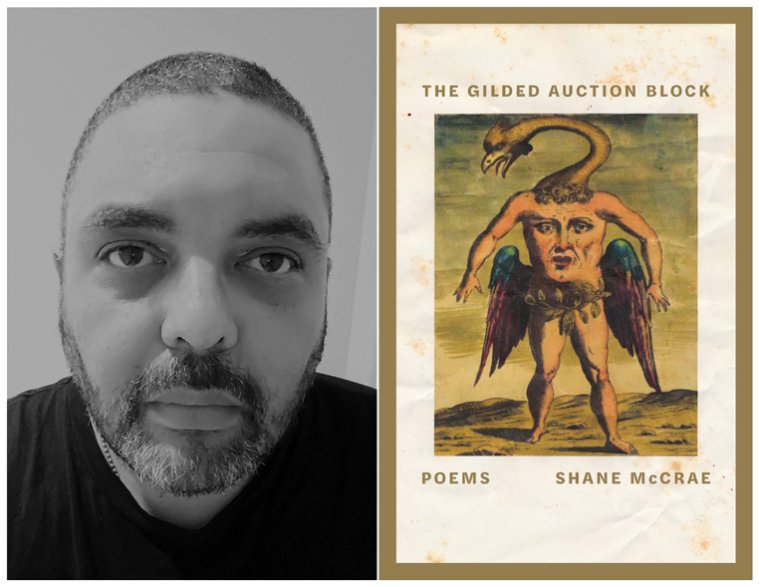This week’s installment of Ten Questions features Shane McCrae, whose sixth poetry collection, The Gilded Auction Block, is out today from Farrar, Straus and Giroux. Employing and subverting traditional meter and form, the poems in the new book confront the 2016 presidential election in the United States from both personal and historical perspectives. The poems interrogate issues of identity, freedom, racism, oppression, and inheritance, using inventive line breaks and spacing to create a sense of disruption and shift, fissures in both text and feeling. McCrae is the author of five previous books, including most recently In the Language of My Captor (Wesleyan University Press, 2017), which won the 2018 Anisfield-Wolf Book Award in poetry and was a finalist for the National Book Award and the Los Angeles Times Book Prize; and The Animal Too Big to Kill (Persea Books, 2015), winner of the 2014 Lexi Rudnitsky Editor’s Choice Award. McCrae lives in New York City and is an assistant professor of writing at Columbia University.

Shane McCrae, author of The Gilded Auction Block.
1. How long did it take you to write The Gilded Auction Block?
I started writing the oldest poem in the book in 2014, and I wrote the newest poem in the book in 2018—so, four years. As with all my other books, I was revising it until the very last possible moment, which in this case was, I think, November 2018.
2. What was the most challenging thing about writing the book?
Maybe not giving up on the long narrative poem—“The Hell Poem”—that takes up a third of the book. I’m a poet! What do I know about narrative? Nothing! But I want to learn.
3. Where, when, and how often do you write?
I write everywhere I can, whenever I can, and as often as I can—I don’t have a set place or time.
4. What was the most unexpected thing about the publication process?
The Gilded Auction Block is my first book with Farrar, Straus and Giroux, and I wasn’t expecting how many opportunities—for readings, interviews, etc.—working with a press that size would enable. I’m grateful for every one of them.
5. What are you reading right now?
Oh my gosh, kind of a lot of things? I’ll narrow the list down to one book of poetry, one book of fiction, and one book of nonfiction. I’m reading Vahni Capildeo’s Venus as a Bear, Kathryn Davis’s The Silk Road, and Thomas Dilworth’s David Jones: Engraver, Solider, Painter, Poet.
6. Which author, in your opinion, deserves wider recognition?
G. C. Waldrep. I think he’s one of the best poets in America.
7. What is one thing you’d change about the literary community and/or the publishing business?
I would get rid of Twitter.
8. What is the biggest impediment to your writing life?
Fear, I suppose. I’m always trying to do something new, which is usually something I’m afraid of. But for the most part the new things I’m trying to do are only new in a small way—like “The Hell Poem.” I had never written a narrative poem before, so that was new to me. But it’s still strictly metrical, as all my poems are. Writing in free verse would be new to me in a big way, and I’m terrified to try.
9. What trait do you most value in an editor (or agent)?
Honesty and kindness.
10. What’s the best piece of writing advice you’ve ever heard?
The construction “there is/are” is weak. Lex Runciman gave me that advice.







